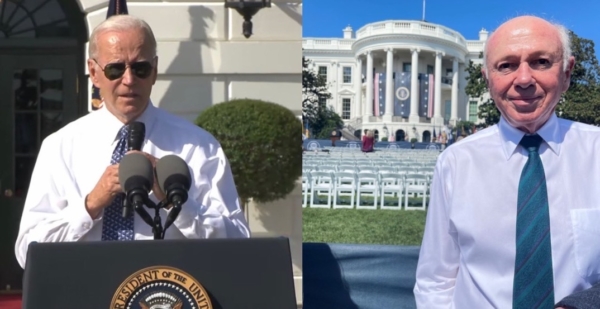
National Committee President Max Richtman and other advocates joined President Biden at the White House on Tuesday for a celebration of the new law reducing prescription drug costs for Medicare beneficiaries, the Inflation Reduction Act. The event, held on the South Lawn, was attended by members of Congress, administration officials, and representatives of seniors’ groups including AARP, the Center for Medicare Advocacy, and the seniors’ council of the Democratic National Committee.
“We have been fighting to lower prescription drug prices for a long time. And even though the new law doesn’t include everything we’d hoped for, this is a significant victory for seniors. To see the Inflation Reduction Act signed into law and then to be invited to participate in this celebration today is truly remarkable.” – Max Richtman, NCPSSM President and CEO, 9/13/22
President Biden touted the hardest-fought provision in the law, the ability for Medicare to negotiate prescription drug prices with drugmakers. The pharmaceutical industry spent millions of dollars trying to defeat that measure, but ultimately failed.
“For years, Big Pharma blocked Medicare from negotiating lower drug prices. But not this year. This year, the American people won, and Big Pharma lost.” – President Biden, 9/13/22
The President credited “brave allies in Congress… and so many determined advocates and activists across the country” for standing up to Big Pharma and pushing the law across the finish line.
The list of lawmakers at the White House event included Senator Joe Manchin (D-WV), who withdrew his support for an earlier iteration of the law but finally conceded to more modest reforms in the Inflation Reduction Act. Majority Leader Chuck Schumer (D-NY) pushed the bill through the Senate via the budget reconciliation process on a 50-50 vote, with Vice President Harris breaking the tie. The House passed the bill on August 12th and sent it to President Biden for signature. Not a single Republican in either house of Congress supported the bill to lower prescription drug costs.
“I want to thank President Biden. We would never, never have gotten the Inflation Reduction Act done without his steady hand. For over a year-and-a-half, he dared us to dream big, pushed us to aim high, and urged us to never let go of our promise to the American people.” – Senate Majority Leader Chuck Schumer, 9/13/22
Under the Inflation Reduction Act, Medicare will begin negotiating the prices of ten of the most expensive prescription drugs in 2024. The negotiated prices will take effect two years later, in 2026. According to Reuters, those drugs “will be chosen from among some of the 50 medicines responsible for the highest Medicare spending that have no cheaper generic or biosimilar alternatives.” By 2029, the number of drugs subject to negotiation will double.
The new law also caps out-of-pocket drug costs for Medicare beneficiaries at $2,000 per year. “That will mean tremendous savings to millions of seniors who have been forced to pay significantly more out of their own pockets up until now,” Richtman points out. “Equally important is the provision in the new law that limits beneficiaries’ costs for insulin to $35 per month. Right now, that figure can easily reach $1,000 or more every month.”
Thanks to the Inflation Reduction Act, Big Pharma can no longer hike drug prices at will without repercussions. “Price increases on drugs will be limited to below the rate of inflation,” reports US News. “Price increases for half of all drugs covered by Medicare outpaced inflation from 2019 to 2020.” Some of those price jumps were more than 7.5% in a single year.

Social Security Commissioner Kilolo Kijakazi and NCPSSM President Max Richtman at the White House
President Biden and Congressional Democrats are hoping that the Inflation Reduction Act will show that the party can fulfill its campaign promises. (Lowering prescription drug prices was one of the key promises in the 2020 election cycle.) It is one of a string of legislative victories for the President and Democrats that may influence voters in the 2022 mid-terms. After all, the party will have difficulty following up on this law with more health care reform for the American people if it cannot hold onto both houses of Congress. “In this case, passing the Inflation Reduction Act was the right thing to do for seniors and good politics,” says Richtman.


